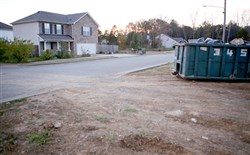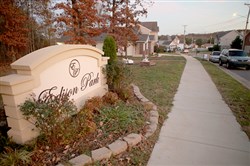VOL. 38 | NO. 48 | Friday, November 28, 2014
New life for ‘zombie subdivisions’
By Kathy Carlson
When the Smiths moved into a brand new home right before Christmas 2007, they had no idea that construction in their Antioch area subdivision would soon stop cold – and stay stopped for four years.
Grass grew tall on vacant lots. Half-finished roads and curbs were the rule. Neighbors were scattered through the Edison Park subdivision. They left their porch lights on at night because there were no streetlights.
The original plan was to build 82 houses, but only 38 had been built before construction halted.
Empty lots and stalled subdivisions – also called zombie subdivisions – sprang up across the Nashville area along with the recession.
Edison Park in South Nashville was perhaps the most difficult of Nashville’s stalled subdivisions to work through. Lots had been sold to several different builders, and each had made separate financing arrangements with various banks.
Metro Councilman Robert Duvall, who represents the area (District 33), says seven subdivisions in his district have gone bankrupt, with three others stalled.
These days, Habitat for Humanity of Greater Nashville is completing Edison Park. Other subdivisions stalled by the 2007-09 Great Recession have come back or are coming back to life – gradually.

An overflowing dumpster on an unfinished lot provides an unsightly view for the residents of a finished house across the street in Antioch’s Edison Park.
-- Michelle Morrow | The LedgerEdison Park is a good neighborhood, Desi Smith says. “It is becoming a better neighborhood, better than having all these empty lots.”
But the slow turnaround is a mixed blessing.
These days, there’s actually a shortage of ready-to-build lots, a shortage that will collide with population growth as a projected 1 million newcomers flock to Middle Tennessee over the next 20 years. The bottom line: housing prices will rise.
Between now and the end of 2019, Nashville and its nine surrounding counties will need 74,500 construction-ready lots, says Edsel Charles, founder and chairman of the new home market research firm MarketGraphics, based in Williamson County.
He says the shortage exists because “not enough cities are willing to zone correctly,” meaning they won’t allow enough housing density for developers to make money. Charles adds there’s no chance that this many lots will be prepared for construction by 2019.

There were 82 buildable lots in Antioch’s Edison Park, but only 38 were completed before the Great Recession halted construction. Habitat for Humanity has helped fill the void.
-- Michelle Morrow | The LedgerBecause of the shortage of developable lots, the number of nonperforming subdivisions has started to decrease by 15 to 20 each year, Charles says. He defines nonperforming as subdivisions where nothing or almost nothing is being sold.
It may seem obvious, but they underperform because developers have bought land in places where people don’t want to live. The subdivisions may be too far from where people work or not have enough restaurants, he explains.
But they’re getting a second look amid the current shortage of construction-ready lots.
There are always nonperforming or underperforming subdivisions, Charles says, and three of 10 may fit that description, even in good economic times.
But that percentage jumped during the recession for a host of reasons:
The developer might have gone broke or didn’t have enough money to finish.
A bank might have ended up owning the property and didn’t know what to do with it.
The property might have been in litigation or for some reason the bank may not have moved forward to foreclose on it.
Investors might have bought the land to hold until prices rise.
The road back has been slow.

Herron
David Luecke, owner and president of Nashville’s Capitol Homes Inc., says he saw the market for homes begin to turn around this past January.
“So few homes have been built since 2009 [that there are] not enough homes for a city that’s growing,” either because builders are cautious or can’t get financing, Luecke says.
Because there are so few finished lots, even partially completed lots such as those in stalled subdivisions will look more attractive to builders.
“I think [builders have] been cautious for a long, long time,” Luecke adds. “Most of them – including myself – want to build for a sale we already have.”
Habitat for Humanity saw a win-win situation in Nashville’s stalled subdivisions. So far it has built 30 houses in Edison Park and plans to build another eight.
The number of houses in the subdivision changed because Habitat declined to buy lots it didn’t consider suitable for building.
Habitat bought lots in Edison Park at about $15,000 apiece, compared with about $40,000 per lot that would normally be spent to develop raw land.
“We got a great discount,” says Danny Herron, Habitat’s president and CEO.
Councilman Duvall was concerned for constituents who had bought their homes before their subdivision stalled out. He and others saw a strong possibility that builders would sell off the stalled subdivisions and fill them with cheaply built houses.
“Builders have rights,” he says, but “people in subdivisions shouldn’t have their dream be at the whim of someone who [buys undeveloped lots].”
He wanted to reach agreements with all concerned – banks, new builders, Metro – that “tried to maintain the integrity of the subdivisions.”
In Edison Park, for example, they worked out an average square footage for new construction, how much brick and stone would be used, and the size of a garage, based on the weighted average of those features in existing homes.
Habitat “could have built a lower-end home” in Edison Park, Duvall says, but the nonprofit decided, after working with Duvall and community members, to build houses in keeping with others there.
“That subdivision was sold out at $100 a square foot,” Duvall explains, adding that that level of construction cost benefited other homes there.
“I see that [Habitat’s participation in building out the subdivision] as a positive, and this coming spring Habitat will have built out sufficiently for Metro to build out the streets.”
Of the 10 troubled subdivisions in his district, Duvall says all are back on track to some degree. Construction has resumed in some, and in others, steps have been taken in preparation for construction.
In Councilman Duane Dominy’s nearby district, one stalled subdivision has come back on line. A second, in the 2600 block of Una-Antioch Pike, still lies dormant. One house was built and sold there, and a partially built townhouse unit burned in 2013.
With the revival of long-dormant subdivisions, the pool of deeply discounted lots is drying up.
Habitat’s Herron says most of the lots left undeveloped during the recession have been absorbed. Out-of-town investors, including real estate investment trusts, are buying up properties in Nashville.
His organization is looking beyond the stalled subdivisions and is now collaborating with state and local government on affordable housing options.
It is examining the possibility of building higher-density housing such as townhomes to make more efficient use of the land and to better meet the needs of smaller families.
Herron says Habitat will continue to build single-family homes, however.
Meanwhile, in Edison Park, Desi Smith knows the weekend has arrived when she hears the early-morning hammering of volunteer builders.
There are still potholes in some streets, but the streetlights work and the vacant lots are becoming fewer. Her grandchildren and other neighborhood kids have become friends and attend the same schools.
“I know it’s a work in progress,” she says.